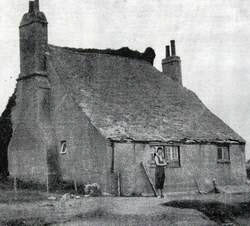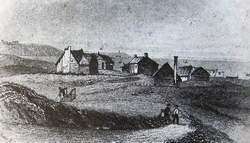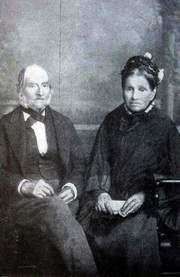Abandoned Communities ..... Hampton-on-Sea
Hampton-on-Sea lay on the coast of north Kent adjacent to the western end of Herne Bay. An oyster fishing company was established there in the 1860s, and after it failed an attempt was made to create a seaside residential estate. Rapid erosion of the coastline meant that only a few houses were constructed, and before long they too had to be demolished as the sea came further inland.
A small community existed at Hampton before the 1860s. There was a farmhouse that may have been built in the Elizabethan period, and a number of crude wooden shacks occupied by people who made a living from fishing, smuggling, and selling fossils. Among the shacks was a brick building, the Beehive public house.
In the early nineteenth century the farm house was occupied by Mr and Mrs Pettman. Mrs Pettman would often give food to local children. In particular she would make suet puddings during cold weather and give one each to the children. On one occasion the puddings were too hard, and the “little urchins” threw them back through the window.
The farmhouse was a meeting place for smugglers, who would hide their goods in caves under the floor. You could buy a jug of rum there for a shilling.
This information about Hampton in the nineteenth century comes from Frank Mount, My Recollections of Hampton, published in 1942.
Two families living at Hampton were the Mounts and the Quicks. According to Frank Mount the Quicks were renowned for their strength. Polly Quick would walk to Faversham to get supplies for her little general shop. She would put the articles in a bundle, put a stick through the bundle, and carry it home. If she met a coastguard patrolling the coast she would stop for a chat, but she would not put the bundle down, presumably in case the coastguard looked too closely at its contents. Her brother, Nimble Quick, acquired his nickname as a result of his agility on board a ship.
In his Recollections Frank Mount spoke about his grandparents Thomas and Sarah Mount. Thomas Mount, born in 1798, worked as a merchant seaman before marrying Sarah at the age of 30. They lived in one of the wooden cottages, a dwelling with just four rooms where they brought up eleven children.
Thomas Mount had a moderately successful career as a fisherman but soon found other ways of adding to his income. He would hail large sailing ships as they were being towed upstream towards London, attach his boat to the ship, and beg supplies of tea, sugar and other commodities from them. On one occasion he hailed a French lugger carrying rum. A deal was done whereby Mount would carry the rum ashore and the French captain would avoid paying duty on it. An appointment was made to meet again on the next visit of the French ship, when 28 kegs of rum and some silk goods were received by Mount. A lack of wind meant he did not get home until it was beginning to get light. He decided to leave the kegs of rum on the bottom of the sea, but before he could return to collect them they were spotted at low tide by customs officers. Mount and his crew were arrested, tried, and sentenced to six months imprisonment.
After his release from prison Thomas Mount could not resist the temptation to go on smuggling, but in due course he was arrested when carrying a full load of contraband. As the customs officers approached his ship two of the crew jumped overboard, but Mount, who was drunk at the time, and the other two crew members were captured. According to Frank Mount the sentence on that occasion was three years service on board a Royal Navy frigate.
On return from his service in the Navy Mount confined his activities to fishing. Usually he was able to make a satisfactory living, but on one occasion during an exceptionally cold winter his family had to seek Poor Law assistance and were placed “in an institution”.
A small community existed at Hampton before the 1860s. There was a farmhouse that may have been built in the Elizabethan period, and a number of crude wooden shacks occupied by people who made a living from fishing, smuggling, and selling fossils. Among the shacks was a brick building, the Beehive public house.
In the early nineteenth century the farm house was occupied by Mr and Mrs Pettman. Mrs Pettman would often give food to local children. In particular she would make suet puddings during cold weather and give one each to the children. On one occasion the puddings were too hard, and the “little urchins” threw them back through the window.
The farmhouse was a meeting place for smugglers, who would hide their goods in caves under the floor. You could buy a jug of rum there for a shilling.
This information about Hampton in the nineteenth century comes from Frank Mount, My Recollections of Hampton, published in 1942.
Two families living at Hampton were the Mounts and the Quicks. According to Frank Mount the Quicks were renowned for their strength. Polly Quick would walk to Faversham to get supplies for her little general shop. She would put the articles in a bundle, put a stick through the bundle, and carry it home. If she met a coastguard patrolling the coast she would stop for a chat, but she would not put the bundle down, presumably in case the coastguard looked too closely at its contents. Her brother, Nimble Quick, acquired his nickname as a result of his agility on board a ship.
In his Recollections Frank Mount spoke about his grandparents Thomas and Sarah Mount. Thomas Mount, born in 1798, worked as a merchant seaman before marrying Sarah at the age of 30. They lived in one of the wooden cottages, a dwelling with just four rooms where they brought up eleven children.
Thomas Mount had a moderately successful career as a fisherman but soon found other ways of adding to his income. He would hail large sailing ships as they were being towed upstream towards London, attach his boat to the ship, and beg supplies of tea, sugar and other commodities from them. On one occasion he hailed a French lugger carrying rum. A deal was done whereby Mount would carry the rum ashore and the French captain would avoid paying duty on it. An appointment was made to meet again on the next visit of the French ship, when 28 kegs of rum and some silk goods were received by Mount. A lack of wind meant he did not get home until it was beginning to get light. He decided to leave the kegs of rum on the bottom of the sea, but before he could return to collect them they were spotted at low tide by customs officers. Mount and his crew were arrested, tried, and sentenced to six months imprisonment.
After his release from prison Thomas Mount could not resist the temptation to go on smuggling, but in due course he was arrested when carrying a full load of contraband. As the customs officers approached his ship two of the crew jumped overboard, but Mount, who was drunk at the time, and the other two crew members were captured. According to Frank Mount the sentence on that occasion was three years service on board a Royal Navy frigate.
On return from his service in the Navy Mount confined his activities to fishing. Usually he was able to make a satisfactory living, but on one occasion during an exceptionally cold winter his family had to seek Poor Law assistance and were placed “in an institution”.
One
Hampton farmhouse, a photograph taken in August 1933. The farmhouse was demolished in December 1934.
The fishing community at Hampton, with the Beehive public house.
Thomas and Sarah Mount, a photograph taken about 1870.


